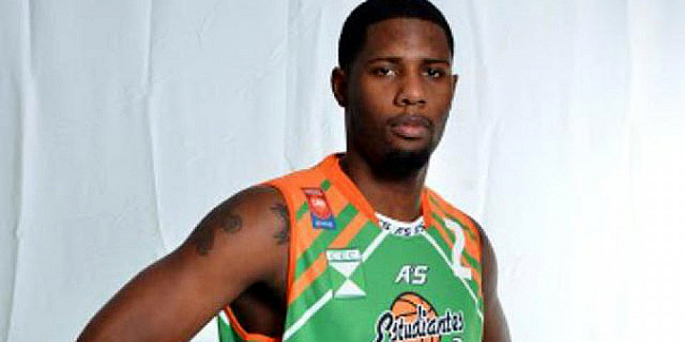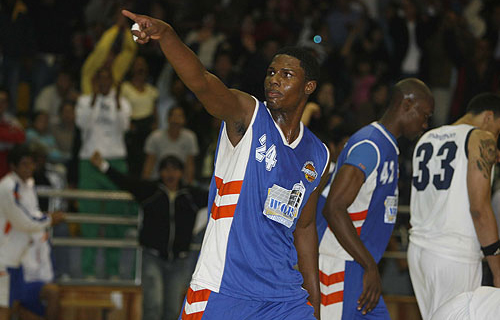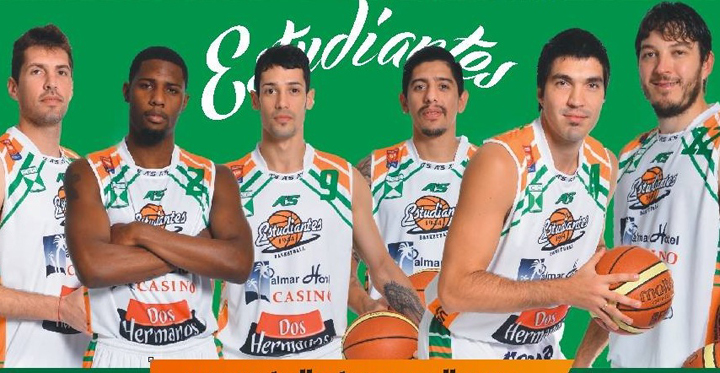
Cuban basketball player — a star in Argentina — wants to play with his national team
His name has faded from the memory of Cuban basketball fans on the island. However, it shines outside and will shine even brighter. Hopefully, that light will cross national borders and all the fans (inside and outside) will be dazzled by Reynaldo García Zamora’s talent.
If he continues on his way, he will probably be the third Cuban to play in the NBA, behind Andrés Guibert and Lázaro Borrell. For now, he is one of the young stars in the Argentine National League, the second strongest in the hemisphere and one of the eight best leagues worldwide.
Twenty-four years old, García left his mark in Ecuador’s and Mexico’s professional basketball. In both countries, his performance on the court deserved all kinds of praise, so much so that teams in Spain — where a high-level game is played — showed (and are showing) great interest in him.
During a recent visit to Havana, his native city, Reynaldo agreed to an interview with Progreso Weekly.
How did you get started in basketball?
I played in Cuba until I left, in 2009. I was playing with Capitalinos, the Cuba B team, and rose to the big team but only for a short time, because I asked to be released so I could try my luck abroad.
I remember the two finals of the Superior League, which we lost against Ciego de Ávila in 2008 and 2009. They were hard-fought games, very hard.
Why did you decide to leave?
I wanted to get ahead financially. That’s no secret to anyone. One wants to help the family to live more comfortably. And besides, basketball in Cuba was taking a course that I didn’t like: too much bullying, too many fights. The standards were dropping.
Also, it was an alternative to stagnation; you wanted to improve your game.
I didn’t want to be like other Cubans who saw their best years pass by without improvement, unable to elevate the quality of their playing.
Was it difficult for you to take that step?
Yes, I was only 19, had risen to the national team, which was my dream. Besides, I had my family to think about. It was a tough time.
Did you have an offer at the time?
Some coaches in Ecuador had contacted me, so I pondered the possibilities for four or five months. After thinking it over and consulting with my family, I accepted.
The Ecuadorean league is not the best known in the continent.
It was the first offer I had, the surest. They were going to give me an opportunity to play, which was most important to me. I knew that [Ecuador] would not be my final destination but a stop on the road toward a better game. There, they helped me to correct technical and tactical deficiencies. As an athlete, I grew at all levels.
Was it hard to adapt?
A lot. Especially the first six months I was alone over there. After that period, I was able to bring along my wife and my mother.
It was worth it, because you became the best in the Ecuadoran league.
My team was season champion three times; in 2009, the year I arrived, and in 2011 and 2013. That last year, I was the League’s top scorer and best player.
So, you decided to take a step up.
I went to Mexico, where I also did well in the national league of professional basketball. I was named to the Dream Team, was chosen best point guard, and was ranked third in scoring and first in stealing.
How about Argentina? That’s a respectable league.
The [Estudiantes de Concordia] coaches saw some videos of me, playing in Mexico, and were encouraged to hire me. I’ve been there since September 2014 and am doing well. That’s a league that resembles European basketball, very tactical, high caliber. A lot of players have gone from Argentina to Europe.
And you’re the only Cuban there?
So far, just me. Ruperto Herrera Junior and Lázaro Borrell played in Argentina, of course. Borrell is well remembered because they say he went through the league like a tornado; he was a phenomenon, a star.
You have played in other leagues. What was your experience?
I’ve played in three South American leagues and two Latin American leagues. Those tournaments are short but are watched by everyone, and if things go right for you, a lot of doors swing open.
What are the main differences between the basketball you play now and Cuban basketball?
In Cuba, the coaches don’t put the same emphasis on individual play; in Argentina they do. We spend one or two hours a day practicing individual play, one against none, one on one. Position game is better [in Argentina]. The tactical approach is very orderly and must be executed as directed. We must be effective even outside the court.
When I was here [in Cuba,] everybody threatened to go to blows after a hard foul and the answer was an elbow to the ribs. [In Argentina,] you can’t do that. When you’re fouled, even if hard, you have to concentrate on scoring the two free throws. If you fight on the court, the club fines you and can even expel you.
In other words, there’s more discipline in Argentina.
Exactly. Discipline is essential to play in that league. You must be punctual in everything and pay attention to every detail, listen to the directions of the coach at every play. If you make a mistake, you may be benched. Everyone plays with great concentration.
And the practice sessions, are they hard?
We practice as hard as possible, as if we were in an actual game. We practice twice a day. In addition to rehearsing the plays, we shoot between 300 and 400 baskets a day. We have three or four games a week, for ten months. It’s a long and complex league.
You play point guard. Is that what you like best?
Yes, that’s the position I most enjoy. I try to make the team play harder and create various situations. I am not a static guard. I watch what the NBA players do, so I can learn from them.
Have you had offers from other leagues?
When I finished in Mexico, I had a possibility to play in Spain for Estudiantes de Madrid, but that team had economic problems and couldn’t give me a contract. It would have been a magnificent opportunity. Now, I only think of doing well in Argentina and later playing in Spain’s first division. There is also a possibility to play in a summer league in the United States.
Many will be watching you there.
That’s a very good thing. Maybe I get lucky and within two years, more or less, I can fulfill my dream of playing in the NBA.
 Many changes are occurring in Cuban basketball. In the near future, players like you who play abroad through personal contracts, without Cubadeportes mediation, could be summoned to play in the national team. Would you play in Team Cuba?
Many changes are occurring in Cuban basketball. In the near future, players like you who play abroad through personal contracts, without Cubadeportes mediation, could be summoned to play in the national team. Would you play in Team Cuba?
I’d really like that. Let’s hope the changes come soon. I’m not the only one. There’s others in smaller leagues who can also help Cuba to have a national team that’s more competitive. I imagine that, at the level of Centrobasquet, we’d be among the favorites. And who knows how far we’d get in stronger tournaments.
Tournaments involving national teams are usually played in summer, when the leagues are in recess. My agent has told me that it would be a good opportunity for me to join Team Cuba.
What other Cubans could play in professional leagues?
With me in Argentina, there’s a Panamanian player who participated in the Central American and Caribbean Games in Veracruz. I asked him about it and he told me that he had been impressed by two: Jasiel Rivero and Javier Jústiz. Said that both had the fitness and talent to be in strong leagues. My coach has seen videos of the two and has expressed an interest in hiring them.
But there are other athletes who could also enter into lower-level tournaments and climb little by little. I think that that would be very good to stop the exodus of so many Cuban athletes who want to improve their game and their personal finances.
Have you seen the current Team Cuba at play?
In Argentina we get the Cubavisión Internacional signal and I saw a rebroadcast of the last three quarters and extra time of the game against Puerto Rico, in the Central American Games at Veracruz. The Cubans played well, but I was surprised that they gave so much responsibility to the younger players. In complicated moments, all the balls went to Jasiel, while there were other athletes with more experience. The Cuban team lacks international experience.
Do you miss Cuba?
I remember it every day. I love being here [in Havana], going to the beach, being with the family and friends, walking the streets. You can’t do that [in Argentina] at certain times because it’s very dangerous.


